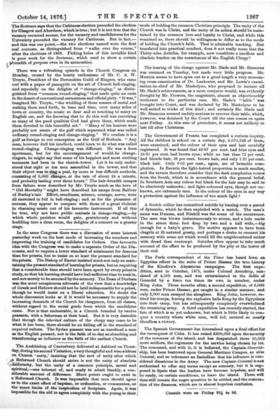In the same Congress there was a discussion of some
interest yesterday week on the best mode of increasing the numbers and improving the training of candidates for Orders. One favourite idea with the Congress was to make a separate Order of the Dia- conate, and to require a lower standard of attainment for deacons than for priests, but to insist on at least the present standard for thepriests. The Bishop of Exeter insisted much not only on main- taining the present standard of learning for priests, but on requiring that a considerable time should have been spent by every priest in study, so that his learning should have had sufficient time to soak in, and not merely to be annexed by the memory. The Dean of Durham was the most conspicuous advocate of the view that a knowledge of Greek and Hebrew should not be held indispensable for a priest, though he would insist on a liberal education. No doubt the whole discussion looks as if it would be necessary to supply the increasing demands of the Church for clergymen, from all classes, without regard to the social grade from which the candidates come. Nor is that undesirable, in a Church founded by twelve peasants, with a fisherman at their head. But it is very desirable that though the inherited culture of the clergy may cease to be what it has been, there should be no falling-off in the standard of acquired culture. The Syrian peasant was not as unrefined a man as the English peasant, nor is the faith of to-day as absorbing and transforming an influence as the faith of the earliest Church.


































 Previous page
Previous page